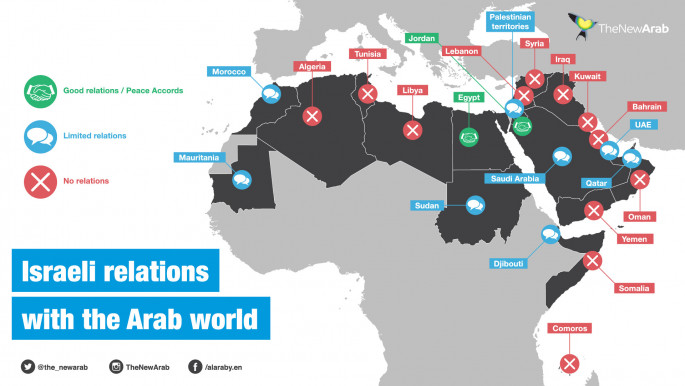While the rest of the world including in nations closely allied to Israel slowly but steadily moves to boycott the apartheid regime in Tel Aviv, Arab states and officials who are supposed to lead the pressure on Israel are keen to do just the opposite, even as Israel is currently ruled by the most anti-Arab government in its short history.
Reports of a brazen visit by a retired Saudi general to Israel, where he met with officials at the head of a delegation of businesspeople and academics, is just the latest episode of the ongoing Arab pilgrimage to the world's last remaining settler-colonial state.
Many took the visit by General Anwar Eshki to be a sign of an overt rapprochement being sought between Riyadh and Tel Aviv, culminating years of alleged under-the-table dealings.
According to Israeli daily
Haaretz, Eshki met with Foreign Ministry Director-General Dore Gold and Coordinator of Government Activities in the Territories Maj.-Gen. Yoav Mordechai and with a group of Knesset members.
The daily called the visit “a highly unusual one” as Eshki couldn't have traveled to ‘Israel’ without approval from the Saudi government.
Eshki and Gold caused an uproar in June 2015 when they held a publicised joint event in Washington, after meeting privately several times over the preceding year. Gold attended the event a few days before assuming the role of director general of the Israeli foreign ministry.
Israeli legislator Esawi Freige, who organised Eshki’s meeting with his fellow members of Knesset, shed some light on the trip. "The Saudis want to open up to Israel," he said.
"This is a strategic step for them. They said they want to continue what former Egyptian President Anwar Sadat started. They want to get closer to Israel. This is clearly evident," Fregie noted.
He was referring to the former Egyptian president's negotiations with ‘Israel’, which culminated in the Egypt–Israel Peace Treaty in 1979 - the first between an Arab state and Tel Aviv at the time.
Palestinian official
Jibril al-Rajoub, who has served in many capacities both political and security, is rumoured to have coordinated the visit.
Relations once-removedSaudi Arabia is not the only state in the Gulf that has had flirtations with Israel. Both the UAE and Qatar have had relations ''once removed'' with Israel, although Doha says it had cut off all ties with Tel Aviv following the brutal Israeli assault on Gaza in 2009.
Countries like Morocco, Mauritania, Djibouti and evn Sudan have engaged in or proposed similar demarches towards Tel Aviv. Both Egypt and Jordan, and briefly Lebanon during the Israeli occupation of Beirut, signed peace treaties with Israel.
Officially, Arab governments have no qualms about recognising Israel. Following the Madrid Conference and the Oslo Accords between a segment of the Palestinians and Israel, Arab governments decided to renounce military means to liberate Palestine and opted for negotiations with Israel as a "strategic choice".
Cosying up to Israel is often motivated by cynical calculations, in addition to alleged
economic benefits and keenness to attract Western aid.
 |
| Click to enlarge |
Since most Arab countries are ruled by undemocratic and unpopular regimes, the latter have often sought protection for their rule from Israel and its powerful lobbies in Western capitals, which deeply influence policy and narratives, especially in Washington.
Case in point: the regime of Egyptian general-turned-president Abdel-Fattah al-Sisi, who, escaping intractable crises at home, has found a "warmer peace" with Israel to be the only way to shore up his legitimacy.
|
 |
Saudi Arabia has been accused of working with the pro-Israel lobby in the United States, especially in the wake of 9/11 |
 |
|
Cynical calculusSimilarly, Saudi Arabia has been accused of working with the pro-Israel lobby in the United States, especially in the wake of 9/11 in which fifteen of its citizens took part, to deflect unprecedented anti-Saudi sentiments in America that are yet to subside.
Saudi Arabia also perceives Iran, rather than Israel, as its main enemy, and has been accused of seeking an alliance with Tel Aviv against their common foe.
Riyadh was behind the Arab Peace Initiative, a proposal from 2003 to recognise Israel in return for the latter's withdrawal to the lines of 1967. Israel's current PM, who is all but publically opposed to the two-state solution, at the time quickly dismissed it.
Turkey's
recent reconciliation with Israel that caved down to Tel Aviv's terms followed a similar logic as the country grapples with crises on all fronts.
But most Arab citizens are vehemently opposed to recognition of, let alone normal relations with Israel, until a just solution of the question of Palestine is reached.
Therefore, any bid by Arab governments and public figures to cooperate with Israel is deeply unpopular and is even seen as
"treasonous" by many in the Arab street, from Morocco to Oman.
Opinions expressed in this article remain those of the author and do not necessarily represent those of The New Arab, its editorial board or staff.



